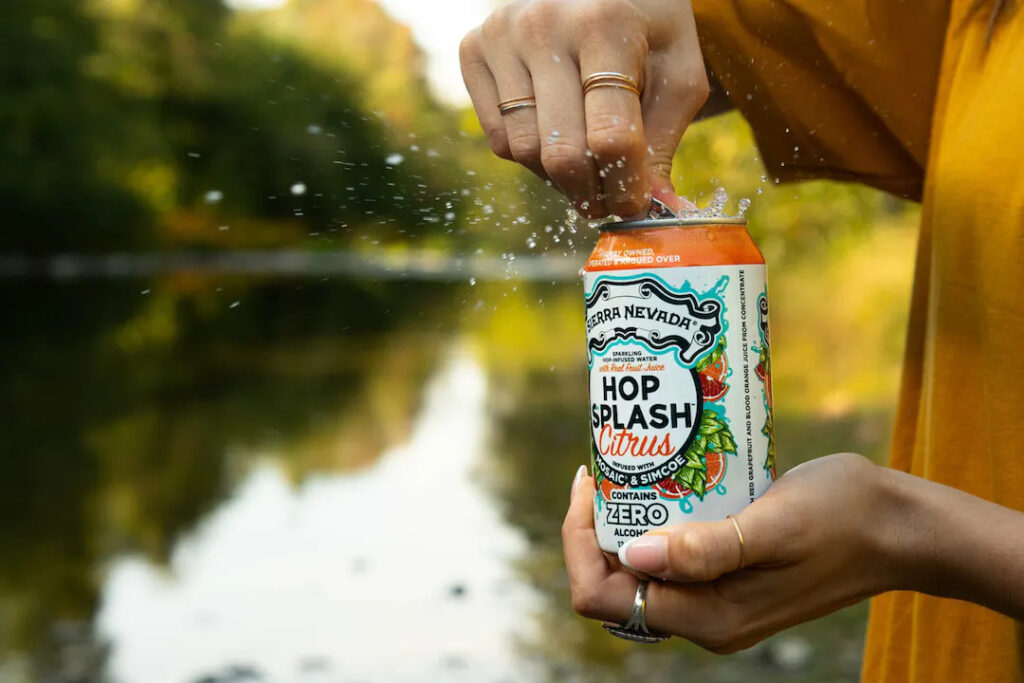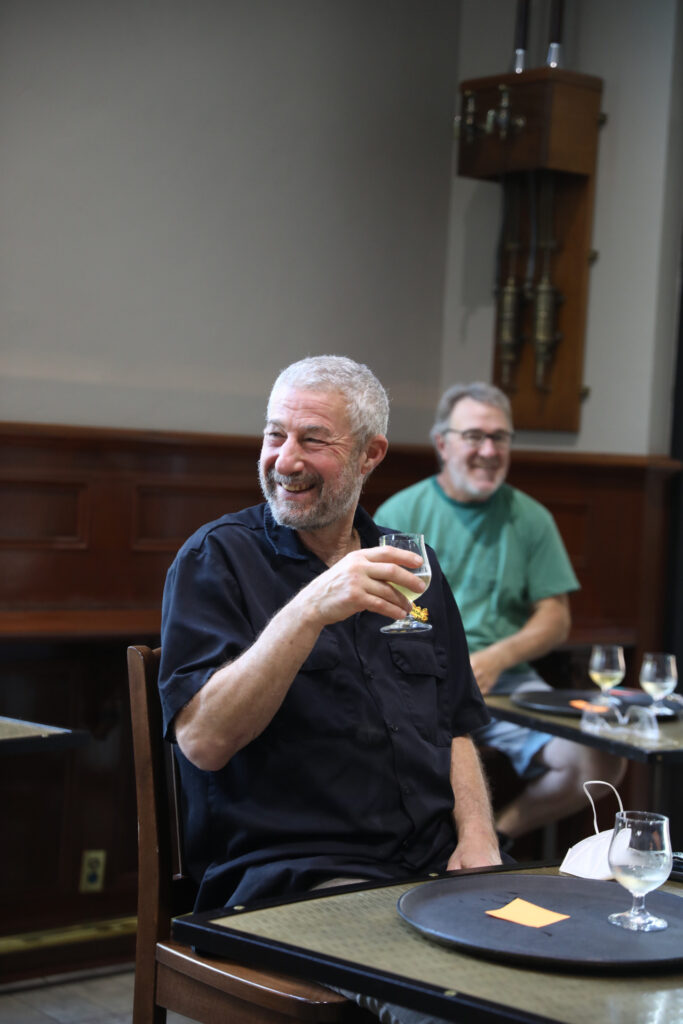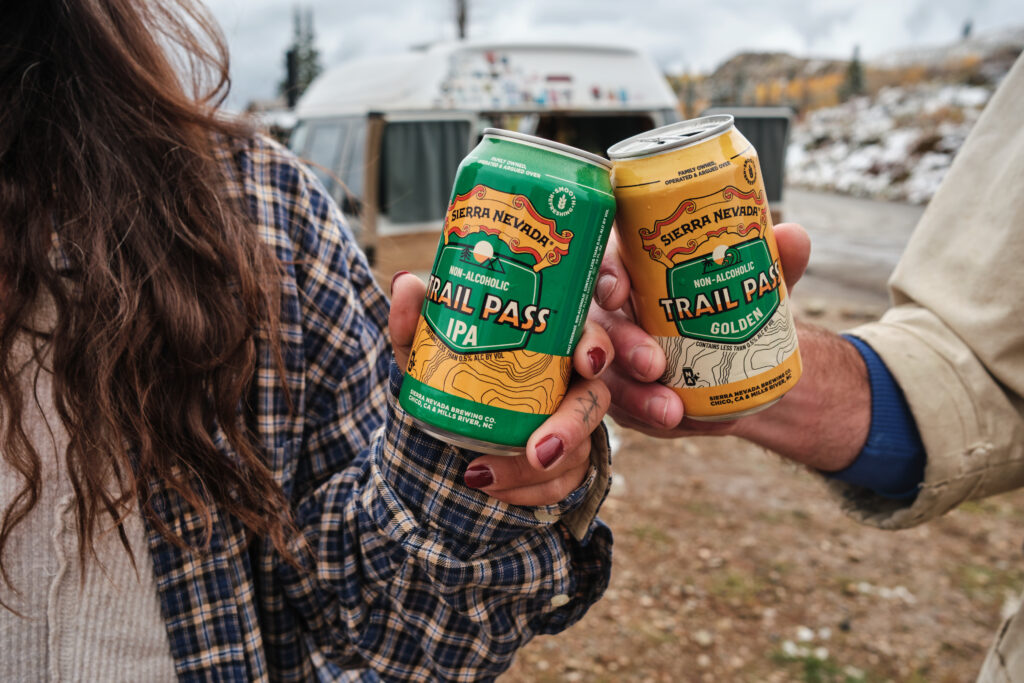By: Jerard Fagerberg

For the past 44 years, Sierra Nevada has defined what craft beer means in America. Now, with the release of Hop Splash and Trail Pass, they’re shifting paradigms of quality, flavor and innovation in the non-alcoholic category.
It’s been nearly a half-century since Ken Grossman and Paul Camusi introduced the world to Sierra Nevada Brewing Co. What began as a humble brewing company in Chico, California, has now blossomed into the third largest craft brewer and 11th largest brewery in the United States, an institution venerated for its complex, flavor-forward portfolio of beers like Torpedo, Bigfoot and Celebration.
As Sierra Nevada has grown in size and esteem, so has the American craft beer industry at large. Where once Sierra was a vanguard of hops and audacity, now it’s seen as a dependable elder statesman. Rarely will you see them risking their laurels on fast-rising fads. That’s why the beer industry took notice when Sierra announced in August that it was debuting a line of non-alcoholic beers called Trail Pass. Trail Pass IPA and Trail Pass Golden not only marked the brewery’s entry into the burgeoning NA beer segment, but they also signaled the competition that Sierra had come to up the ante.
Trail Pass debuted in January alongside Hop Splash Citrus, a grapefruit and blood orange-infused extension to the brewery’s successful 0% ABV sparkling hop water line. Together, Trail Pass and Hop Splash represent Sierra’s latest rebellion: a considered, elevated non-alc experience for craft beer diehards.

“We felt like it was in our best interest and the best interest of our drinker to give them an option that we believe meets the same quality standards that we have for our alcohol products,” says Brand Director Kyle Ingram. “We felt like we could do it better than what was out there currently in the market, and I think we’ve achieved that.”
A Long Trail to Pass
When Trail Pass was announced, Ingram admitted to Brewbound that Sierra was “a touch late to the NA party.” Over the past five years, zero-gravity has become a cultural phenomenon. According to a report from Berenberg Research, young Americans are drinking about 20% less per capita than their forebears, and the rise in moderate drinking has led to an enormous market opportunity. The non-alcoholic beer segment is now valued at $22 billion, and industry experts expect that number to increase to $40 billion in the next decade.
Punch Drink writer Jordan Michelman has declared the 2020s the golden age of non-alcoholic beer, and breweries have rushed at the opportunity in this cultural change. Import brands (Heineken, Guinness), American standbys (Coors, Samuel Adams), and large craft breweries (Lagunitas, BrewDog, Sierra Nevada) have cornered the market, and a slew of dedicated NA brands like Athletic Brewing have risen to compete.
Sierra Nevada is more accustomed to ushering in golden ages than tagging onto them, but Ingram says the brand’s late entry into the category is intentional. Grossman laid out a challenge to the team: whatever NA beer they produce, it had to be on par with Pale Ale. Sierra innovation brewers James Conery and Isaiah Mangold spent almost five years trying to meet and exceed that standard, and it wasn’t until they sent Trail Pass to test markets last fall that they knew they’d nailed it.
The breakthrough came when the team began using a hybrid yeast that naturally ferments below 0.5% ABV. The process allows them to keep the integrity of the beer intact without allowing undesirable, stale-tasting compounds to develop. The team was able to get a full malt flavor out of Golden, giving it the round, consistent mouthfeel of a full-booze brew. And when it came to Trail Pass IPA, Sierra knew they had to go heavy on hops. They carefully dosed the beer with Amarillo and CTZ, giving it that legendary Sierra Nevada West Coast bitterness.

“If we could have been first with a great product that we felt was good enough to put a name on, that would have been nice,” Ingram says. “But from an innovation, philosophy, and strategic standpoint, sometimes it’s okay to be a fast follower, if it means getting it right.”
A Splashy Addition
In a recent trial, Wirecutter identified Hop Splash as the most “hop-forward” hop water, something Ingram takes as a point of pride. That was precisely the aim when Sierra brought the Citra and Amarillo-infused sparkling waters to the market in late 2022. And drinkers have responded – Hop Splash is already the No. 2 SKU in hop waters, according to Nielsen scan data.
“What people expect from Sierra Nevada is hops, hops, hops, and we delivered,” Ingram says. “[Hop Splash] is for folks like myself who are self-identified hop heads. I don’t just want hops in my beer, I’m looking for hops in other product categories as well.”
Still, Sierra wasn’t satisfied with simply joining the hop water fray, they wanted to elevate the style. Taking cues from both Spindrift Sparkling Water and juicy IPAs, they created Hop Splash Citrus, which blends the pithy citrus flavors of Mosaic and Simcoe hops with real blood orange and grapefruit juice. It feels like a new paradigm for the category while still maintaining the Sierra ethos that was forged back in 1980.
Ingram says that Sierra is still “looking to stretch the brand in different ways” in non-alc and beyond beer. Hop water with added juice might be novel, but it’s not the end. And whatever comes after Hop Splash and Trail Pass will be held to the same maxim: Does this live up to the reputation of Pale Ale, Torpedo Extra IPA, and Sierra’s other stalwarts?
That evaluation starts with the opinion of one man: Grossman. And so far, the Founder and Chairman of the Board is impressed.
“A lot of hard work and effort went into developing these bestin-class NA products, and I think consumers will find that Trail Pass and Hop Splash raise the bar for what a non-alcoholic drinking experience can be,” Grossman says. “We have a lot of early momentum, and we’re not slowing down on R&D for new innovations.”
About the Author: Jerard Fagerberg is a freelance drinks writer and product manager based in Kittery, Maine. His name is not Jared, but lotsa folks get that wrong.
